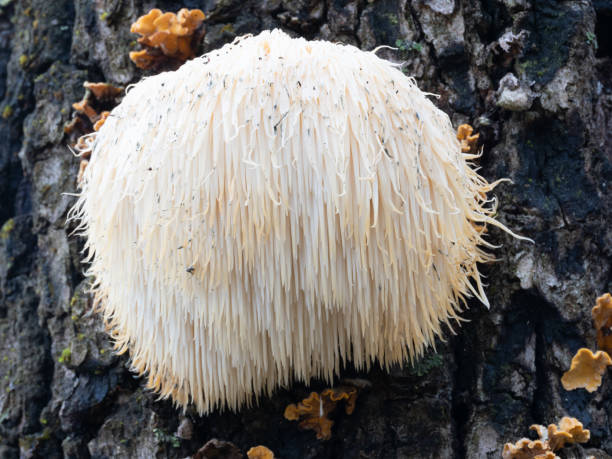Lions Mane Mushroom: 9 Health Benefits You Should Know
9 Health Benefits of Lion’s Mane Mushroom: Unlocking Cognitive Potential and More
Lion’s mane mushrooms are more than just a cool-looking fungus that resembles a lion’s mane—they’re a nutritional powerhouse. In this post, we dive into the 9 health benefits of lion’s mane mushrooms and uncover the scientific reasons why more people are turning to this mushroom supplement to boost cognitive function, fight fatigue, and even support heart health.
If you’ve ever wondered whether taking a mane supplement or mane mushroom extract could help improve your memory, reduce stress, or provide long-term beneficial effects on the body, this guide is for you.
Backed by research including a compelling pilot study, you’ll learn about the acute and chronic effects of lion’s mane supplementation on cognitive function, and how to use it safely and effectively.
9 Health Benefits of Lion’s Mane Mushroom
- What Is Lion’s Mane Mushroom and Why Is It So Popular?
- How Does Lion’s Mane Improve Cognitive Function?
- Can Lion’s Mane Really Help Regenerate Brain Cells?
- What Are the Heart Health Benefits of Lion’s Mane?
- Does Lion’s Mane Have Anti-Inflammatory Effects?
- What Does Research Say About the Effects of Lion’s Mane on Anxiety and Depression?
- Are There Any Potential Side Effects of Lion’s Mane Mushroom?
- What’s the Best Way to Take a Mane Supplement?
- How Do the Acute and Chronic Effects of Lion’s Mane Compare?
- Who Can Benefit Most from Lion’s Mane Supplementation?
1. What Is Lion’s Mane Mushroom and Why Is It So Popular?
Lion’s mane mushroom (Hericium erinaceus) is a unique-looking mushroom known for its shaggy appearance that resembles a lion’s mane.
Found naturally growing on hardwood trees, lion’s mane has been used for centuries in traditional Chinese and Japanese medicine as a dietary supplement for improving brain and nerve health.
In recent years, Western research has confirmed many potential health benefits of this mushroom, including enhancing cognitive performance and reducing inflammation. This growing interest has led to a surge in lion's mane supplements, powders, teas, and capsules.
What makes lion’s mane mushrooms contain such powerful properties? The answer lies in their bioactive compounds, especially hericenones and erinacines, which help stimulate the growth of brain cells and repair damaged nerves.
2. How Does Lion’s Mane Improve Cognitive Function?
One of the most exciting health benefits of lion’s mane is its impact on the brain. Studies have shown that lion’s mane extract may help enhance memory, focus, and learning ability by promoting nerve growth factor (NGF) production.
NGF plays a vital role in maintaining brain function and protecting against cognitive decline.
A pilot study on older adults taking mane mushrooms daily for 1 month showed measurable improvements in memory and mental clarity without any negative side effects. These beneficial effects suggest real potential for using lion’s mane mushroom extract to help manage mild cognitive impairment.
The supplementation on cognitive function is particularly promising for older adults, but younger individuals seeking to improve cognitive performance at work or in sports are also seeing beneficial effects on the body and mind.
3. Can Lion’s Mane Really Help Regenerate Brain Cells?
Yes—research suggests that lion’s mane mushroom may help stimulate the regeneration of damaged nerves and even regenerate brain cells and improve cognitive repair after injury.
Animal studies have shown that mane extract may help inhibit neuronal cell death, accelerate healing from nerve damage, and support the creation of new connections between neurons.
In fact, an animal study found that lion’s mane helped repair nerve injury faster than other natural remedies. These regenerative powers may explain why lion’s mane mushroom is often recommended for people recovering from strokes, concussions, or other brain injuries.
4. What Are the Heart Health Benefits of Lion’s Mane?
Beyond the brain, lion’s mane also supports heart health. Research shows that mane mushroom extract has anti-inflammatory and antioxidant properties that can help reduce LDL cholesterol, prevent blood clots, and improve overall cardiovascular health.
One study found that lion’s mane reduced the level of oxidized cholesterol in the bloodstream—a key marker for atherosclerosis. The effects of lion’s mane mushroom on blood lipids and inflammation may make it especially beneficial for people at risk of heart disease.
This mushroom may also improve circulation and oxygen delivery to the brain and muscles, which adds to its reputation as a performance-enhancing mushroom supplement.
5. Does Lion’s Mane Have Anti-Inflammatory Effects?
Inflammation is at the root of many chronic diseases. That’s where lion’s mane truly shines. Mane mushroom extract has anti-inflammatory effects, especially in the brain and gut. This could make lion’s mane helpful for conditions like Alzheimer’s, multiple sclerosis, and inflammatory bowel diseases.
These anti-inflammatory effects also play a role in its potential to ease joint pain and reduce muscle soreness post-exercise—another reason athletes and high performers are taking mane supplements.
In addition to helping fight inflammation, mane mushroom and its extracts are loaded with antioxidants that protect against oxidative stress, which can damage brain cells and accelerate aging.
6. What Does Research Say About the Effects of Lion’s Mane on Anxiety and Depression?
Several studies indicate that lion’s mane mushroom may positively affect mood and stress levels. One study of menopausal women found that taking lion’s mane extract significantly reduced feelings of anxiety and depression over just four weeks.
The properties of lion’s mane that stimulate nerve growth also support neurotransmitter production—especially serotonin and dopamine—which are essential for mood regulation.
Lion’s mane extract may help balance the nervous system and offer a natural alternative for people looking for relief without pharmaceuticals. It’s no wonder that taking lion’s mane is becoming more common for people dealing with burnout or emotional fatigue.
7. Are There Any Potential Side Effects of Lion’s Mane Mushroom?
Like many dietary supplements, lion’s mane supplementation is generally safe, but some people may experience mild potential side effects such as digestive upset or skin rashes.
That said, most users report fewer side effects than with other nootropics or adaptogens. Clinical trials show that even high doses can be tolerated without any negative side effects in both animals and humans.
If you're new to lion's mane supplements, start with a small dose and gradually increase to assess your tolerance. And, of course, consult a healthcare provider—especially if you're pregnant, breastfeeding, or taking medications.
8. What’s the Best Way to Take a Mane Supplement?
Lion’s mane is available in many forms: capsules, powders, tinctures, teas, and even coffee. For fast results, mane extract was more effective than whole mushroom powder, thanks to the higher concentration of active compounds.
Look for a mushroom supplement containing 14 or more active beta-glucans and erinacines. Quality matters—choose products with third-party testing and no fillers.
Mane mushroom powder is a great option for smoothies or pre-workout drinks.
Lion’s mane capsules are more convenient for travel or daily use. For optimal results, use lion’s mane extract consistently for at least 4–6 weeks.
9. How Do the Acute and Chronic Effects of Lion’s Mane Compare?
The acute and chronic effects of lion’s mane can vary. Acutely, some people feel increased mental clarity and energy within a few hours of taking it. These are likely from the antioxidant and anti-inflammatory actions of the extract.
Chronic use—meaning taking mane extract daily for several weeks—has more powerful effects. Studies have shown that lion’s mane may improve memory, support neural regeneration, and protect long-term cognitive function.
When comparing short-term boosts versus long-term gains, both are valuable—but the chronic effects of lion’s mane are what make it truly transformative for brain health and aging.
10. Who Can Benefit Most from Lion’s Mane Supplementation?
The benefits of lion’s mane mushrooms apply to many groups:
- Older adults looking to protect or restore cognitive function
- Athletes and performers needing focus and recovery support
- Students or professionals seeking mental clarity and productivity
- People experiencing stress, burnout, or anxiety
- Anyone with inflammatory conditions or nerve damage
In other words, if you want to support brain function, boost resilience, and enjoy beneficial effects throughout the body, taking a mushroom supplement containing lion’s mane may be a smart move.
Key Takeaways: The 9 Health Benefits of Lion’s Mane Mushroom
- 🧠 Boosts memory and cognitive function by stimulating nerve growth
- 🔬 Regenerates brain cells and supports recovery after injuries
- ❤️ Improves heart health by reducing cholesterol and improving circulation
- 💪 Provides anti-inflammatory effects to fight chronic disease
- 😌 Reduces symptoms of anxiety and depression
- 🍄 Supports overall brain function and mood balance
- 🧬 Offers antioxidant protection from free radicals
- ✅ Safe for most people with minimal side effects
- 🧴 Available in multiple forms, including powders and capsules for daily use
Whether you're looking to improve cognitive clarity, protect your brain as you age, or recover from stress and burnout, lion’s mane mushrooms and their extracts deliver serious natural support. When it comes to mushroom power, lion’s mane truly leads the pack.
For More Training Advice + Diet and Lifestyle visit us Combat Creatine
PS: Make sure you check out the rest of our Training Guides:
Creatine
- Creatine Supplements Ultimate Guide
- Creatine Monohydrate Gummies
- Creatine Powder Vs. Pills
- Creatine HCL vs Monohydrate
- How Does Creatine Work
- Does Creatine Make You Poop?
- Does Creatine Break a Fast
- A Guide to Supplement Forms
- Creatine Supplementation Side Effects
- Creatine Myths
- Creatine Pros & Cons
- Creatine Monohydrate Powder
- Creatine Recovery
- Creatine Loading Phase
- Women Should Take Creatine
- Creatine Kinase













